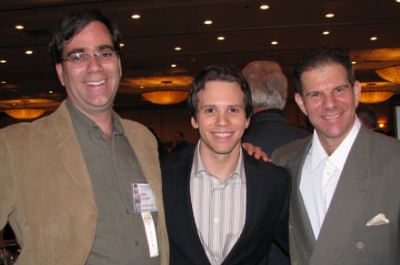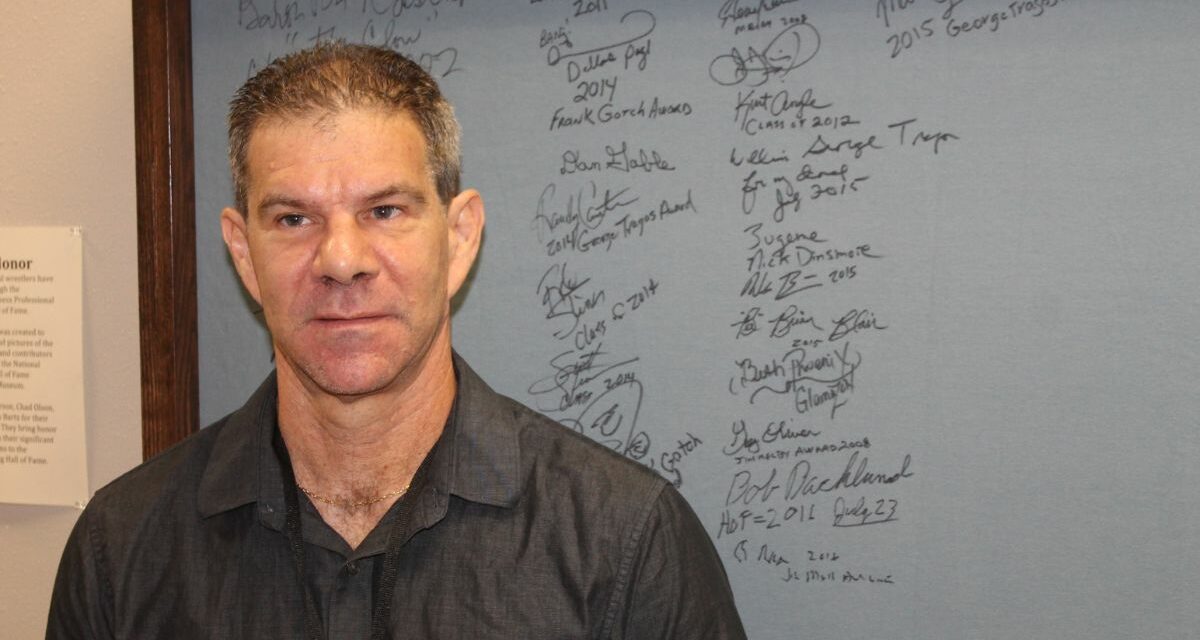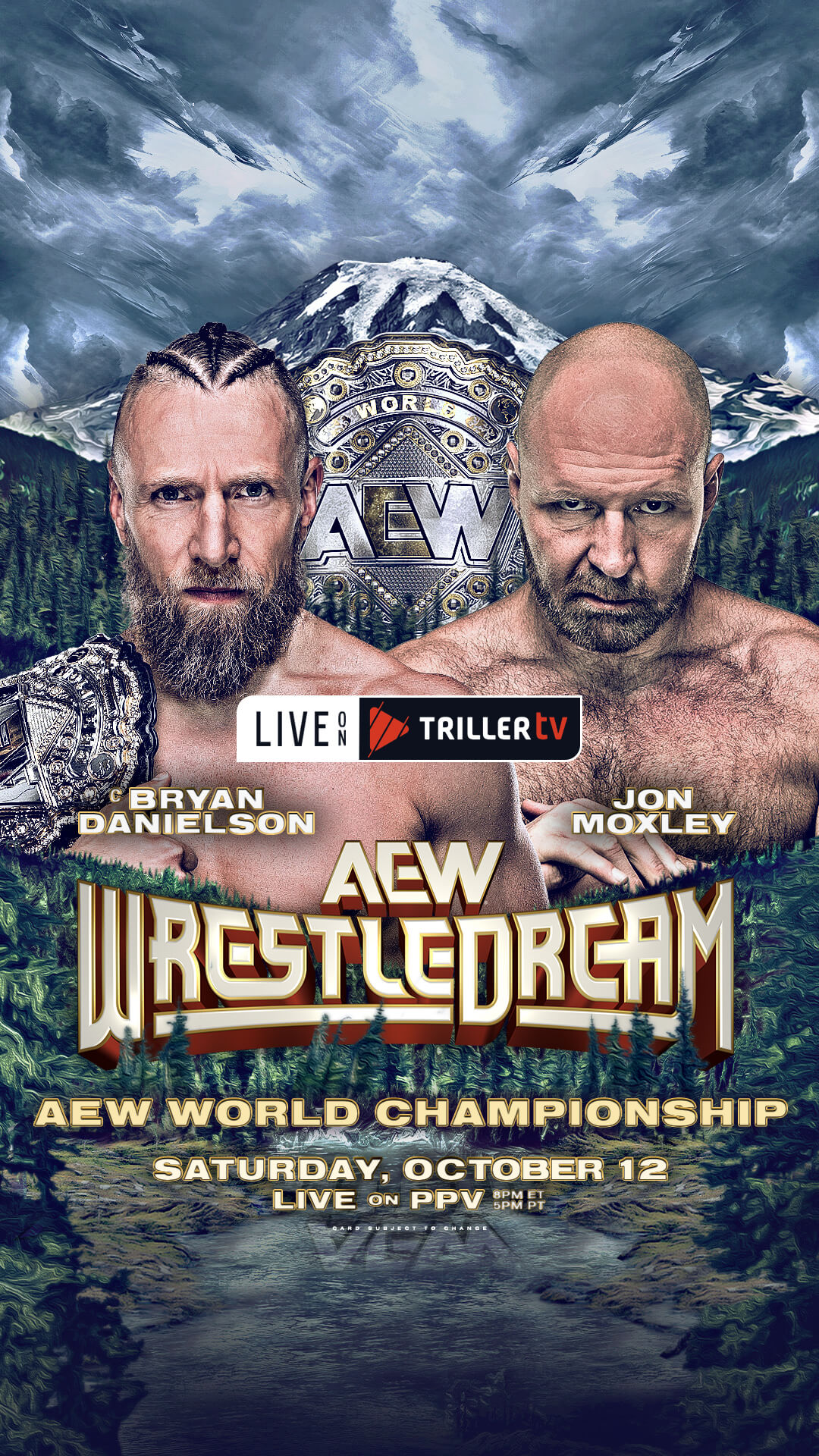For more than 30 years, Dave Meltzer has been covering professional wrestling and mixed martial arts through his newsletter, The Wrestling Observer. Considered both as a historian and journalist, Meltzer will receive the Jim Melby Award this weekend at the National Wrestling Hall of Fame in Waterloo, Iowa. It’s an honor he’s looking forward to.
What one needs to understand is that even if Meltzer started watching professional wrestling as a kid, his first passion wasn’t wrestling, but actually sportswriting.
“My cousin told me that it was pretty clear when I was three years old that I would be writing about baseball,” Meltzer told SLAM! Wrestling. “She said that I was writing on a typewriter one thing at the time. I don’t remember this at all, but that’s what she told me. I remember writing about baseball when I was six though.”

Dave Meltzer
Fans usually are smartened up about wrestling at a later age, but when you’re a child, most believe that wrestling is real, particularly in the 1960s. But not Dave Meltzer. Born October 24, 1959, he went to his first wrestling show in San Jose, when he was nine. When he went to school the next day, his older classmates told him and his friends it was all fake.
“So we went to the next show and we watched really closely, and there was a midget match on,” remembered Meltzer. “The other stuff looked real enough for a little kid, but the midget match wasn’t and I was like, ‘Wow, they were right’ and I never thought about it again honestly.”
Meltzer began sitting at ringside to take photos and the older kids who were regulars at the matches started talking to him. Just by listening to the conversation, he figured out much of what made wrestling tick.
By 10 years old, he already had a newsletter going. And if many hardcore fans are known to have been tape traders, Meltzer was actually a step ahead of that. As a kid, and before VCRs ever existed, he started trading audio cassettes with friends in Los Angeles, Detroit, New York, Florida, Hawaii, Minneapolis. “I knew who could talk and who could do a great promo, guys like Superstar Billy Graham and Dusty Rhodes.”
Although his parents were not fans, their passion for travelling helped Meltzer’s thirst for wrestling.
“My parents loved to travel and I hated it. Once I became a wrestling fan, I loved to travel even more than them,” he said. “They wanted to go sight-seeing, I just wanted to go to the hotel room and find out what time on Saturday the wrestling show is. And if I was lucky, go to a live show. I went to live shows in a lot of places. We would go to the Olympic in Los Angeles, the HIC in Honolulu, the Miami Beach Convention Center, a mile from where my grandparents were living.”
Wrestling phased down in the late 1970s in Northern California, so Meltzer’s interest level wasn’t the same, although he kept following the business through magazines and his trades. In 1979, Georgia Championship Wrestling with the likes of Ric Flair, Wahoo McDaniel and Tommy Rich started airing in San Jose through TBS and he really got back into it and subscribed to a newsletter that he had subscribed to when he was a kid. Around 1980, he got his first VCR and started to trade tapes with other fans around the United States. With his tapes, he was sending results and reports on what was going on and one person told him that his reports were so good that he should start doing his own newsletter.
“I told myself, ‘I did a newsletter before, maybe I could sell it and send it to the magazines to see if people would buy it.’ By this point, I was getting tapes from Mid-Atlantic and Central States in St. Louis among others. And that was kind of like how the idea for the Observer got started.”
The name The Wrestling Observer came from the already-existing mainstream newspaper, The Observer. After earning a journalism degree at San Jose State, Meltzer started a career as a sportswriter. But he continued doing his newsletter as a hobby, learning early lessons from a few key people. “Larry Matysik was certainly a real important person. Bill Watts, Paul Boesch, those kind of guys. Watts was really good about explaining his logic of the business.”
He ultimately had to choose between sportswriting and his newsletter.
“I never even considered making a living out of it until 1986,” he recalled. “Because when I was working as a sportswriter and doing the wrestling and not sleeping at all, and it’s one of these things where you’re so exhausted and you have to choose one or the other, and the logic would have been to just stay in sportswriting. I was doing way way more. And I said, ‘You know what? I’m gonna work really hard to make my name next year and I’m gonna go full-time in this,’ and I did and everybody was telling me I was a complete idiot. In 1987 it was just enough that it worked; in 1988 I started to be able to kind of make a living out of it, but by 1989 I was doing pretty well. In hindsight, it was the right move. It was a very lucky move. Right place, right time. But the logical thing to do would have been to drop wrestling in 1986.”
A very well-known journalist helped Meltzer getting noticed. Frank Deford, a Sports Illustrated veteran who was named U.S. Sportswriter of the year six times, was looking for someone to cover pro wrestling for the start-up National Sports Daily.
“John Cherwa, a sports writer at the L.A. Times and Dick Ebersol from NBC told Frank, ‘You’ve got to hire Dave Meltzer,’ and as soon as he did, Linda McMahon kind of freaked out on him, so that’s pretty funny,” Meltzer remembered.
Deford once said that Meltzer was “the most accomplished reporter in sports journalism.”
“I was doing okay in 1988 and the exposure I got that year lead me to The National. The National turned it around,” Meltzer added.
If his newsletter would have not worked, Meltzer has no doubt that he would have followed in Deford’s path and continued as a sportswriter for years to come.
“I think I would have covered baseball, basketball, football, I was into all of them. I would have been a sportswriter for sure. I would be into every sport on television. I knew the ‘A’ sports but I knew the ‘B’ sports too. I kind of studied all of them before wrestling overwhelmed everything.”
Aside from 1985, there were two other occasions where Meltzer wasn’t sure what the future held for him.
“In 2001 when WCW and ECW died, I was talking to an older fan from Montreal and how the Montreal feud in the ’70s between All-Star and Grand Prix was very similar to WCW and WWE. And he was telling me that the gist was that one group won and then they did inter-promotional stuff that did well and one year later, the place was dead. And I’ve seen the same thing in roller derby. So I thought the same thing would happen in WWE. Not that it would fold, but that the business was really going to go down. And I thought for about a year that it was inevitable that The Observer was not going to be doing well.”
As fans and customers were getting more accustomed with the Internet and developing technology, Meltzer found it a boon. “What really changed for me is when PayPal came in. My subscriptions exploded due to PayPal. So by 2003, I knew that The Observer was going to be fine no matter what.”
Some years earlier, in 1993, Meltzer covered the very first UFC show. At the time, few really knew what it really was and some people even thought it was as fixed as wrestling was. But that’s not the reason why Meltzer started covering what would become mixed martial arts.
“I always covered Japan and in the 1990s, MMA and wrestling were almost the same in Japan so if you were covering one you almost had to cover the other,” he explained. “If you were covering Japanese wrestling, you had to cover Pride, and Pancrase even more.”
Because some fighters in the first UFC like Ken Shamrock were also pro wrestlers, he decided he should talk about the U.S scene too.
“It was like a minor independent show coverage. But as they got more popular and bigger, with Dan Severn who was also a pro wrestler, it just became one of the promotions I covered.”
With double duties now, he increased his already high amount of work and on March 1, 2008, he arrived at crossroads: he needed to rethink what he wanted to do with his professional life.
“I was working at Yahoo Sports and doing The Observer and the website and it was pretty tough. I was in Columbus, Ohio, for the Dan Henderson versus Anderson Silva fight. The show was over and I had to write a story for Yahoo and my brain was just blank. I couldn’t write. I was just mentally exhausted. I had to change something. I either had to quit Yahoo or I have to figure out something. So right then, I called Bryan Alvarez.”
Based in Washington state, Alvarez was the publisher of the Figure Four Weekly newsletter. They were already friends, as they had worked together in the late 1990s on The Wrestling Observer Hotline and then co-hosting the original Wrestling Observer Live broadcast on eYada. Three months later, on June 12, Alvarez’s Figure Four Online and Meltzer’s Wrestling Observer officially merged, a decision Meltzer has never regretted.
“It was a risk for both of us, but believe me, it was the best business — and mental — decision, I had ever made in my life. It allowed me to stay at Yahoo, and the podcast thing became really popular too. And after one week, the subscription numbers showed that it was the best decision ever. I told Bryan that we should have been doing this years ago.”

SLAM! Wrestling producer Greg Oliver, Bryan Alvarez of Figure Four Weekly and the Wrestling Observer Newsletter’s Dave Meltzer at the Cauliflower Alley Club banquet in April 2010.
Although more people are reading it today due to its online version, Meltzer remembered that a lot of wrestlers were reading The Observer as early as 1985, even though very few of them would have actually said it out loud.
“In Jim Crockett Promotions and Mid-South, two-thirds of the guys were subscribing, and a third to a half were in WWF. In World Class, there wasn’t that many but they would pass it around. Everybody was reading it in the business.”
Meltzer always covered pro wrestling like it was any other sport. He started rating matches, created year-end awards and established the renowned Wrestling Observer Hall of Fame. In a business so secretive and with a lot of egos, he did rub many people the wrong way throughout the years.
“I got some threats, but nothing serious. If it was a different era, maybe. But the idea of someone getting mad by 1984-1985 for exposing the business was kind of silly. Sometimes people got mad at what I wrote. If I said someone is not really good. And I got nasty phone calls for sure. But not as much as people think.
And does it still happen today?
“Yeah, now it’s on Twitter,” he laughed.
Over the years, many fans have referred to The Observer as a dirt sheet. Although he considers his publication to be a combination of news gossip, business and entertainment reviews all in one, he wants to set the record straight about the term.
“The guy who invented the term was Zane Bresloff,” he said. “Before being involved in the wrestling business as a promoter, Bresloff was in the music industry, and there was a publication who was giving the grosses of the shows, the inside information, and the people in the music business used to call it the dirt sheet. That’s where the dirt sheet name comes from. So it wasn’t a negative term to me. But in this day and age, the way people are using the term, I mean come on, it’s 2016 and you’re using a term from 1983 and you don’t even know what the term means, so it’s just funny to me.”
Working from his home in Campbell, Calif., he works every day on his newsletter, something that is not always easy when you have a wife and two kids.
“I put endless hours every week and I write tons every day. I have my one day with my family, but even then, I will do my writing in the morning and then whenever I come back, late at night, I catch up with whatever happened that day. It’s really hard to manage both this and a family life. It’s never easy.”
Meltzer, who got married in 2002, has a daughter who is six and a son who’s 14 named Cody, after Dusty Rhodes’ son. In a funny twist, Cody Meltzer’s best friend is named Dusty — after “The American Dream” himself!
Cody will be with his dad Saturday, July 23rd, when Meltzer receives the Jim Melby Award, given to a wrestling historian or journalist at the George Tragos/Lou Thesz Professional Wrestling Hall of Fame induction banquet. It is named in honour of James C. Melby, a wrestling historian and magazine editor, who worked among other publications for the Wrestling Revue and Wrestling’s Monthly. Melby received the first award in 2006 and was told that going forward it would be named after him. Melby passed away from diabetes a few months later in February 2007.
“It means something to me because when I started my first newsletter, I sent it to Jim Melby and he wrote in Wrestling’s Monthly about it saying it was a really great thing and put it over big and that’s how I started to get subscribers. I mean not a lot, but that got me started,” said Meltzer. “It means something to me because without him, there’s zero, zero percent chance this thing would’ve ever happened if he would’ve not written that. Nobody would have had subscribed when I first started doing it and I would have never gone back to it with The Wrestling Observer. I had fun doing it when I was a kid and that’s one of the reasons why I decided to go back to it, but it would have never survived without Jim Melby, so to me it’s really really big.”
Dave Meltzer will join a list of great historians and journalists who have received the Melby Award, including the museum’s founder Mike Chapman, Mike Mooneyham, J Michael Kenyon, Scott Teal, Bill Apter, George Napolitano, Larry Matysik, Wade Keller and SLAM! Wrestling’s own Greg Oliver and Steve Johnson.
Other names being honoured as a part of the George Tragos/Lou Thesz Professional Wrestling Hall of Fame weekend are Chael Sonnen, JJ Dillon, Lex Luger, Bob Backlund, Iron Sheik and Joe Blanchard.
TOP PHOTO: Dave Meltzer in July 2016 in Waterloo, Iowa, at the George Tragos/Lou Thesz Professional Wrestling Hall of Fame. Photo by Greg Oliver
TRAGOS/THESZ CLASS OF 2016 STORIES
- July 23, 2016: Backlund & Iron Sheik headline Tragos/Thesz Hall of Fame
- July 19, 2016: Melby Award for Meltzer proper recognition for pioneering work
- July 18, 2016: Backlund says he ‘doesn’t deserve’ Tragos/Thesz Hall of Fame induction
- July 2, 2016: Tragos/Thesz Hall of Fame has a ‘family reunion atmosphere’
- Feb. 8, 2016: Chael Sonnen perfect for George Tragos Award – just ask him
- Jan. 27, 2016: JJ Dillon ‘humbled’ by Thesz Award
RELATED LINKS


